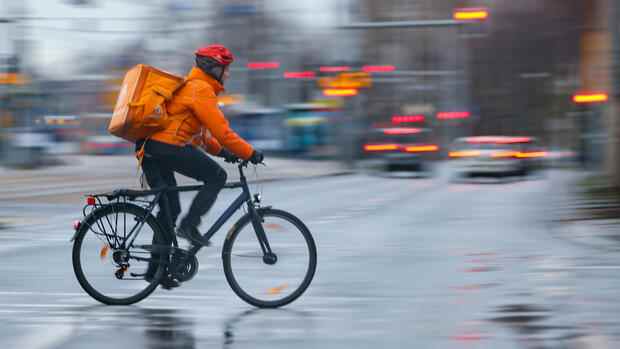Dusseldorf The competition in the highly competitive business of fast food delivery is becoming even tougher. The restaurant delivery service Lieferando now wants to deliver groceries, drugstore items or ready meals in Berlin within half an hour from its own warehouse.
The test in Berlin could be the prelude to a larger attack on the established fast delivery services such as Gorillas and Flink. “The pilot in Berlin will show us the local potential in more detail,” confirms Lieferando Managing Director Katharina Hauke.
This is bad news for competitors. After a turbulent growth phase, so-called quick commerce, i.e. the delivery of products within less than an hour, is about to be consolidated. So far, none of the providers have made a profit. And the way there could be made even more difficult by the attack by Lieferando.
Because Just Eat Takeaway.com, the parent company of Lieferando, is not just any small provider. The group generated sales of 4.5 billion euros last year, of which 567 million euros were in Germany. Based in Amsterdam, the company operates in 25 countries.
Top jobs of the day
Find the best jobs now and
be notified by email.
In the pilot test, Lieferando customers in Berlin-Charlottenburg can choose from a range of around 1,000 items. Deliveries are made from a centrally located warehouse using the existing fleet of bicycle messengers.
Delivery Hero failed with delivery service in Berlin
The new shop is available in the “Food” category of the Lieferando app. In addition to fresh fruit and vegetables, baked goods and frozen food, Lieferando Express also carries drugstore and baby products as well as local brands such as Roy Kombucha, the Berliner Kaffeerösterei and Zeit für Brot.
For Just Eat Takeaway, it’s the first attempt in Europe to deliver from a warehouse. The model is the “Skip Express Lane” service that the company has set up in Canada. In addition to restaurants, other companies can also offer goods there, which are then driven out by the suppliers. According to Just Eat Takeaway, more than 25,000 stores worldwide are already active as partners on the marketplace, including well-known brands such as Albert Heijn, 7-Eleven, Coop, Spar, Shell and Asda. The business is to be further expanded globally, it is said.
The Delivery Hero example in particular showed how difficult it is to set up such a fast delivery service with its own warehouse locations. The company wanted to establish a delivery service in Berlin under the Food Panda brand, but failed.
At the end of 2021, Delivery Hero had stopped its delivery service in Berlin after only five months – although CEO Niklas Östberg had said a month earlier that he would give the business ten to 15 months to develop. The “growing number of providers and the lack of drivers” led to this decision, Delivery Hero justified the step.
>> Read here: Delivery Hero surprises with improved figures: the share reacts significantly
In other countries, on the other hand, Delivery Hero is continuing to expand Quick Commerce. And the necessary construction of a network of small warehouses has already cost the company a three-digit million amount. That’s why Delivery Hero has so far explicitly excluded this line of business when the company talks about being operationally profitable by the end of the year.
Wolt has closed its own warehouse in Berlin again
For Just Eat Takeaway, too, an expansion of Quick Commerce in Europe would probably not be a sure-fire success. The company has the advantage that, unlike Delivery Hero, it already has a network of delivery drivers in Germany. But the business has to take off so well that it justifies the investment in more warehouses.
In Berlin in particular, the competition is tough. Service Wolt, which specializes in restaurant deliveries, also wanted to get into the delivery of groceries from its own warehouses there. But after a short time he has now closed his three warehouses in Berlin again.
Having a strong foothold with its own virtual supermarkets in Germany would mean high investments in the coming years, the Finnish company justified the decision. However, it wants to continue to deliver groceries from partner shops and rely on cooperation with chains such as the Edeka subsidiary “Nah & Gut” or “Tegut”.
Lieferando’s advance is particularly delicate for gorillas. The start-up had grown rapidly, but now had to significantly scale back its ambitions. Under pressure from its investors, it’s focusing more on the path to profitability than growth.
>> Read here: Gorillas’ search for new financiers falters: sale as a way out?
The company has laid off around 300 employees and intends to concentrate on the core markets of Germany, Great Britain, France, the Netherlands and the USA. But now it is likely to become even more difficult, at least in the home market of Germany, to earn money for the first time.
More: Delivery services market worth billions – Rewe counters gorillas, picnic and Knuspr.
